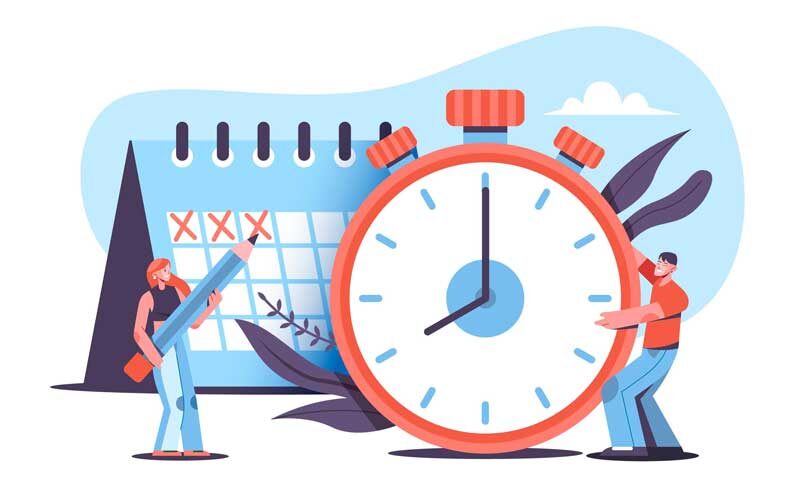What is time management?
Time management refers to using less time and energy for unimportant things and concentrating a lot of energy and time on the most important things. In other words, time management is managing, and operating a given time for each person. The most important goal of time management is to achieve the desired results in the shortest time by effectively working time.
Why are time management skills important?
Everyone has the same amount of time when they have to deal with tasks entrusted at work or submit tasks assigned at school. Some people complete tasks or tasks within a given time, but others fail to meet them, causing disruptions to the company’s work or failing to get the desired score. Time management skills are needed to manage time well and achieve targeted results. As online classes and telecommuting at home increased due to the pandemic, the boundaries between work and home became blurred. Accordingly, the importance of time management skills to increase productivity while managing time effectively has increased. By learning time management skills, people can improve the overall time of their life to prioritize and improve their work and academic outcomes. People can also learn to work effectively while reducing stress and increasing work productivity.
Benefits of effective time management
1. Higher levels of productivity
The biggest advantage of effective time management is increased productivity through high concentration. By prioritizing and preventing wasting time and energy on unnecessary places through time management, people can fully spend energy and time on important goals and focus on the most productive activities. Through time management, people can improve their work productivity and efficiency by planning daily and working more in a shorter time.
2. Less stress
Effective time management can be the solution for those who are always under pressure due to the immediate deadline and task completion date. By prioritizing and planning important tasks, people can meet tight task completion deadlines and reduce pressure and stress levels on deadlines. Effective time management helps people balance work and life well, giving them positive effects of quality sleep and improving confidence by not being dragged or overwhelmed by time.
3. More energy and motivation
In general, when people spend their time without planning, they often feel low energy or tired. When energy decreases and physical strength decreases, concentration on work decreases and work can be delayed. Effective time management helps people use their limited energy for the most important tasks. High productivity levels can be maintained, and work motivation can be increased by intensively using power only where necessary, rest for the rest of the time, and replenishing energy.
4. Prevent procrastination
The most important reason for managing time effectively is not to procrastinate. Performing tasks without planning cause distractions and eventually delays the completion of tasks because time cannot be controlled. When time is managed and owned effectively, people can control their work, and they can complete their work without delaying it by focusing on their goals.
How to improve time management skills
1. Set priorities
First, it is necessary to know that the most important thing is not the most urgent thing to deal with. Effective time management requires distinguishing between urgent and important tasks. Covey, Merrill, and Merrill (1994) categorize the time management matrix into four areas: urgent, non-urgent, important, and non-important. It was suggested that activities in important and urgent areas must be carried out. More time can be spent on non-urgent but important activities by spending less time on non-important activities. If people prioritize and focus on important activities, they can use their time more efficiently and productively.
2. Use planning tools
It is very helpful to use personal planning tools to improve work efficiency and productivity. Writing deadlines, schedules, work content, and other important lists on personal planning tools helps people focus on important priorities. Personal planning tools such as calendars, index cards, diaries, phone tabs, and planners are useful tools to prioritize and review daily to eliminate time-wasting habits while increasing productivity.
3. Stay healthy
The time to get enough rest and invest in maintaining one’s health is a necessary time to have a more productive and efficient time. Taking time to recharge away from digitally surrounded tasks helps people gain new strength mentally and physically, making the work faster and more efficient. It is very beneficial to have time to shut down all digital devices and get a full night’s sleep or to reward oneself with enough rest after completing a project.
4. Schedule appropriately
Effective scheduling is the key to time management. To make an organized schedule, it is important to know about yourself first. You first figure out what kind of work you spend the most time on, when the most productive time of the day is, and which of the tasks you oversee requires the most time, and then make a schedule. Setting the most important and difficult tasks at the most energy-rich and productive times and starting with high-priority activities is useful for efficient use of energy and time.
Conclusion
Depending on how people plan and spend the same time given to everyone, they can increase the productivity and efficiency of the work. Effective time management will improve people’s confidence in their studies and work and achieve much better results by working smarter with less effort. Also, by making successful time management a habit, people will be able to live more achievement, personal happiness, and a more satisfying future life at work and school.
References
- FutureLearn, 2022. Time management skills: How to manage your time [online] Available at: < Time management skills: How to manage your time – FutureLearn> [Accessed 25 July].
- Mark Pettit, 2020. The top 10 benefits of time management. [online] Available at:< 10 Benefits of Time Management – Lucemi Consulting> [Accessed 26July].
- University of Georgia Extension, 2022. Time management: 10 strategies for better management. [online] Available at:< Time Management: 10 Strategies for Better Time Management | UGA Cooperative Extension> [Accessed 28July].
